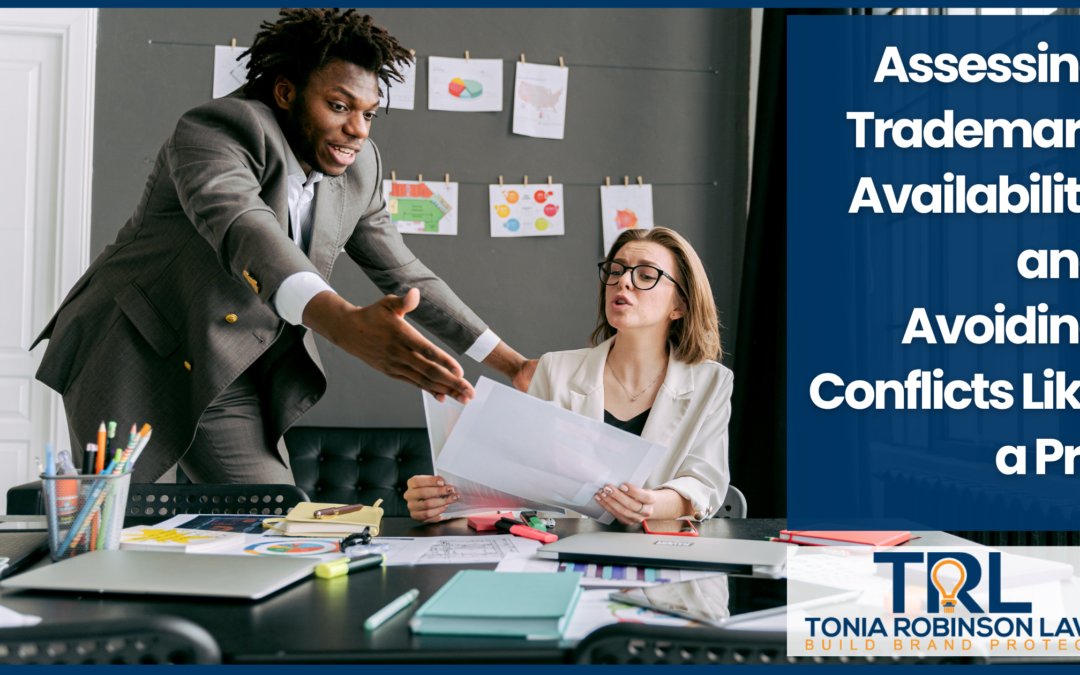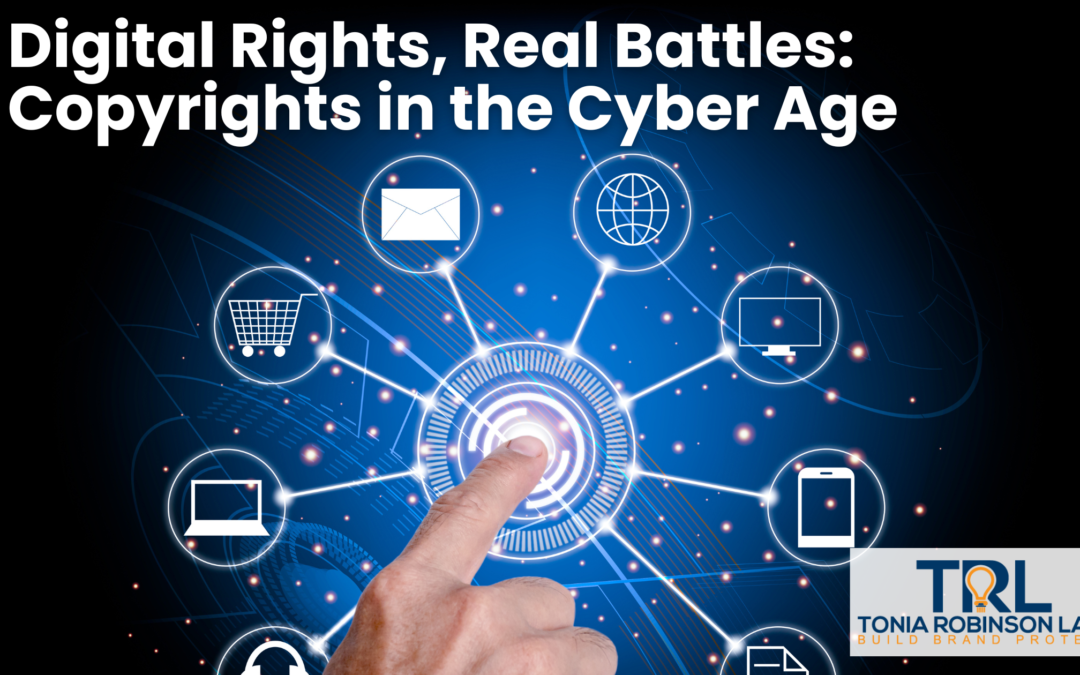
Jul 17, 2024 | Uncategorized
Launching a new product or business is exciting, and choosing the perfect name is a big part of that process. Ensuring your trademark’s availability is crucial to avoid legal issues and protect your brand.
Imagine you’re about to launch your brand-new product or business, and you’ve got the perfect name picked out. But before you unleash your brainchild on the world, there’s a crucial step you need to take: ensuring your trademark is truly yours to use.
Why Bother with a Trademark Search?
To dodge the legal drama, of course. Think of a trademark search as your personal legal shield, protecting you from the arrows of potential lawsuits. It’s your first line of defense against stepping on any legal toes.
Ensuring your trademark is unique not only sets you apart from the crowd but also builds a loyal customer base that recognizes and trusts your brand alone. Doing this process first is a real time saver. Finding out early that your dream trademark is taken can save you from the heartbreak (and bank-break) of rebranding later on.
How to Conduct a Rockstar Trademark Search
Kick things off with a simple preliminary search. Use online tools like the United States Patent and Trademark Office’s (USPTO) database to look for direct matches. It’s like checking if someone else has already RSVP’d to the party with your outfit!
Next, broaden your search to include similar-sounding names, alternate spellings, and visual twins. This step is about making sure there are no hidden gems you’ve missed. It’s ok to bring all your works in progress along with you on the search. It can help eliminate overused business names to help you stand out.
Tips to Keep Your Trademark Conflict-Free
Once you’ve gathered your intel, it’s time to consult with a trademark attorney. They’ll help you sift through the noise and give you the lowdown on whether your chosen mark is really as cool and conflict-free as you think. Engaging a professional might cost a bit upfront, but think of it as investing in peace of mind. They’re the seasoned pros who know where to look and what to look for.
Make your mark stand out by adding unique logos or design elements. It’s like accessorizing—done right, it can turn heads and ward off copycats. Understand where your trademark competitors are playing. If your mark is common in another state or country, knowing this can help you steer clear of potential clashes.
Keep Your Eyes Peeled
Stay vigilant by monitoring new trademarks that might encroach on your turf. Think of it as keeping your garden free of weeds. It may seem tedious, but it will be worth it to protect your brand.If you’re ready to secure your trademark and need legal advice, contact Tonia Robinson Law at (415) 450-7663 to schedule a consultation. Protect your brand and ensure you get the peace of mind you deserve.

Jun 18, 2024 | Uncategorized
In today’s digital whirlwind, the quest to protect copyright is akin to navigating a bustling cityscape—dynamic, complex, and always on the move. For creators and corporations alike, the internet’s vast expanse is both a playground of endless possibilities and a battleground where the rules of engagement are continually evolving. For copyright holders, from solo creators to expansive corporations, these changes make it essential to have a nuanced approach to copyright management, combining an understanding of both technological advancements and the legal principles that protect intellectual property.
Tackling the Hydra of Online Piracy
Imagine online piracy as a multi-headed hydra, lurking in the depths of the digital sea. Each head represents a different challenge: unauthorized streaming services, peer-to-peer (P2P) networks, and websites filled to the brim with pirated content. Cutting one head off seems to only sprout another, as the ease of copying and sharing digital content spawns new piracy platforms overnight. Combatting this beast requires a hero’s arsenal—legal strategies, savvy use of digital rights management (DRM) technologies, and a shield of public awareness to protect the realm of creative content.
Social Media Maze
Social media platforms are like bustling marketplaces, where photos, videos, music, and text are exchanged with the casual ease of passing notes in class. But here’s the twist: not all notes are meant to be shared. When copyrighted material gets passed around without permission, the marketplace becomes a maze of copyright disputes. While platforms try to play referee with automated systems like Content ID, we often find ourselves on the receiving end of controversies regarding fair use, erroneous copyright claims, and unwarranted content removal. Managing copyright protection on social media necessitates familiarity with each platform’s policies.
Cloud Computing: The Final Frontier
The cloud—it’s not just a fluffy cumulus floating in the sky but the final frontier of copyright protection. Cloud computing has revolutionized data storage and access, presenting novel challenges for copyright enforcement. As content drifts into this nebulous space, enforcing copyright laws becomes pretty complex. To safeguard copyright in such environments, it’s crucial for cloud service providers to adhere to copyright laws, establish clear usage terms through contractual agreements, and implement technological measures to monitor and control content distribution.
Your Partners in the Digital Odyssey
Combating the challenges of copyright protection in the digital era demands a multifaceted approach. Updates to copyright laws will continue to evolve, but not at the same rate as the technology that impacts it. Advancements in technology for detecting and mitigating copyright infringement play a huge role, as does the education of creators and consumers about the significance of respecting intellectual property rights. Together, these strategies aim to create a digital ecosystem where copyrighted material is protected and valued, making it easier for creators to express themselves safely.
As we chart the course together through the ever-changing digital landscape, remember that Tonia Robinson Law is more than just a law firm—we’re your crew, your co-navigators, and your champions in the quest to protect what’s rightfully yours. Ready to start the adventure? Reach out and schedule a consultation with us today. Let’s make the digital world not just a place to explore but a domain where your creativity is respected and protected.

Feb 15, 2024 | Uncategorized
Hello, fellow creatives and innovative thinkers! Today, we want to delve into a topic that’s as vital to your brand as a masterstroke is to a canvas – trademarks. These unique symbols, distinctive logos, and creative taglines are the essence of what makes your brand one-of-a-kind.
In the ever-competitive business world, trademarks are your brand’s personal stamp, distinguishing your creative vision and setting your work apart. So, let’s explore how trademarks can be the key to carving out your unique niche in the marketplace.
Trademarks: Your Brand’s Unique Identifier
Think of your trademark as the signature on your masterpiece. It’s the identifier that customers recognize and associate with the quality and originality of your work. Whether it’s a visually striking logo or a cleverly crafted brand name, your trademark is a reflection of your brand’s personality and values.
Standing Out in a Busy Marketplace
In a marketplace brimming with competition, your trademark helps your brand shine. It’s the marker that makes customers pause and take notice, differentiating your offerings from the rest. A distinctive trademark can be a deciding factor for consumers, conveying your commitment to creativity and quality.
The Strategic Value of Trademarks
Trademarks offer more than just an artistic touch; they provide essential legal protection. This protection ensures your unique ideas and brand identity are shielded from imitation and misuse. It’s about securing the integrity of your work and the trust you’ve built with your audience. Essentially, your trademark is a declaration that your brand’s creative flair is exclusively yours.
Legally, owning a trademark grants you exclusive rights to use your specific symbols or names in connection with your products or services. This exclusivity is a potent tool in maintaining your brand’s uniqueness. Strategically, trademarks are assets that can grow in value alongside your brand’s reputation. They can be licensed, sold, or used as a foundation for expanding your brand’s reach.
Building Brand Equity with Trademarks
Trademarks play a vital role in developing brand equity. They create a lasting impression, fostering recognition and loyalty among your customer base. Over time, a well-managed trademark becomes synonymous with the qualities your brand stands for, significantly enhancing your brand’s overall value.
In the creative and business world, trademarks are crucial in establishing and protecting a strong, unique brand identity. They are pivotal in differentiating your business in a competitive environment and safeguarding your reputation. For creative businesses looking to make a lasting impact, investing in a distinctive trademark is a step towards ensuring your vision and hard work are recognized and respected.
At Tonia Robinson Law, we understand the importance of your creative and business endeavors. If you’re looking to secure your brand’s identity with a trademark, we’re here to help. Schedule a consultation with us by calling (415) 450-7663, and let’s work together to protect and enhance your brand’s unique voice in the marketplace.

Jan 15, 2024 | Uncategorized
Copyright is a fundamental legal tool that protects the works of authors, artists, musicians, and all kinds of original compositions. It grants exclusive rights to these creators over their works. However, the principle of fair use is an often necessary counterbalance, ensuring the free flow of ideas and information, which is important for fostering innovation and knowledge sharing.
Just think of all the potentially forgotten stories just waiting to be retold! With this great power, comes great responsibility, though, which means it’s important to understand how these laws work to remain respectful to the original creators.
Exploring Fair Use
Fair use is a legal concept that allows limited use of copyrighted material without needing permission for specific purposes like criticism, teaching, or research. It plays a significant role in enabling creative freedom and encouraging intellectual engagement. The United States Copyright Act’s Section 107 outlines fair use as an allowable exception.
Courts look at four factors to assess fair use:
Purpose and Character of Use: Imagine you’re at a talent show. One contestant takes a classic song and turns it into a hilarious parody, giving it a whole new twist. That’s what courts love – a transformative use that adds new flavor or meaning to the original. Just hitting ‘copy-paste’ on a work, however, is like a singer performing a hit song note-for-note. Sure, it’s good, but it lacks originality.
Nature of the Copyrighted Work: Here, the courts weigh if a work is more like a riveting novel or a straightforward news report. Creative works are like the divas of the copyright world – they get more protection. So, taking a snippet from a news article for your blog is usually cool, but using chunks of a blockbuster movie? That’s likely a no-go.
Amount and Substance Used: This is where less really is more. It’s like cooking; a dash of salt can perfect a dish but pour in the whole packet, and you’ve ruined it. Using a small, carefully chosen snippet of a work can be fair play, like a movie reviewer showing a 10-second clip. But screen the whole film? That’s overdoing it, and the courts probably won’t applaud that.
Effect on Market Value: This is all about the money. If your use of someone’s work starts taking dollars out of their pocket, it’s likely not fair use. It’s like if you started selling cheap knockoffs of a designer dress right outside their boutique. If what you’re doing could hurt the original’s sales, the courts might just give you the gong.
Practical Advice for Using Copyrighted Material
Fair use can be a subtle area, but here are some basic guidelines:
- Use only what is necessary for your purpose.
- Keep your use distinct from the original and cite sources when needed.
- Always credit the original creator.
- Avoid using copyrighted material for commercial purposes.
- Seek legal advice if unsure about your use’s compliance with fair use.
Getting Creative
In essence, fair use stands as a beacon of balance in the world of copyrights, offering a bridge between the protection of original works and the flourishing of new creative expressions. It’s a delicate dance of respecting the past while embracing the future, ensuring that the legacy of creators is honored even as new stories are told. Whether you’re an artist, educator, or innovator, understanding and applying the principles of fair use is crucial in your creative journey.
For guidance on fair use or other copyright matters, Tonia Robinson Law is ready to assist. We offer clear, practical advice to ensure your creative activities and respect for intellectual property rights go hand in hand. Schedule a consultation with us to utilize your inspirations with confidence.

Dec 8, 2023 | Uncategorized
For artists and entrepreneurs with a groundbreaking app idea, the journey from concept to pitch is full of excitement and potential pitfalls. One important aspect that’s often overlooked in the eagerness to show off an amazing new app is the protection of the idea itself. Before presenting your app to potential partners or investors, it’s vital to safeguard your intellectual property. This ensures that your unique concept remains yours and prevents others from capitalizing on your innovation.
Understanding Copyright and Trademark Protection for Apps
Copyright Protection
Copyright protection is key for app developers, as it covers original works of authorship. For an app, this includes the source code, the user interface (UI) and user experience (UX) design, and any related documentation like design documents and user manuals. To secure copyright protection, you should register your app with the U.S. Copyright Office. This registration not only solidifies your legal rights but also facilitates the enforcement of these rights in case of infringement.
Trademark Protection
Trademarks protect words, phrases, symbols, or designs that identify and distinguish the source of goods or services. For an app, this can include the app name and logo, any unique catchphrases or slogans, and custom icons or graphics. Registering your app’s trademark with the U.S. Patent and Trademark Office (USPTO) grants you exclusive rights to the mark and the ability to take legal action against unauthorized use.
Implementing Additional Protective Measures
Beyond copyright and trademark protection, there are further steps you can take to protect your app idea:
Non-disclosure Agreements (NDAs): Before engaging in discussions with potential partners, investors, or collaborators, have them sign NDAs. This legal document ensures that any confidential information about your app remains protected.
Regular Documentation: Keep detailed records of your app’s development, including design sketches, code versions, and brainstorming notes. This documentation can be crucial in establishing the timeline of your app’s development.
Secure Communication: When discussing your app, especially the confidential details, use secure communication channels to prevent unauthorized access to sensitive information.
Taking these steps significantly lowers the risk of your app idea being appropriated by others. It also positions you to fully benefit from your innovation and hard work.
Your Sword & Shield
Navigating the legal minefield of protecting an app idea is as important as the development of the app itself. Employing a combination of copyright and trademark protections, along with additional safeguards like NDAs and provisional patents, is crucial in securing your intellectual property. These measures not only protect your app idea but also ensure that you maintain the rights to the rewards of your creativity and hard work.If you are preparing to pitch an app idea and want to ensure that your intellectual property is fully protected, Tonia Robinson Law is here to help. Our team is dedicated to guiding artists and entrepreneurs through the complex landscape of intellectual property law. Schedule a consultation with us today by calling (415) 450-7663, and let us help you secure the legal protection your app idea deserves.

Nov 7, 2023 | Uncategorized
Hey entrepreneurs and artists, we know you’ve poured heart, soul, creativity, and endless cups of coffee into crafting your one-of-a-kind ideas and masterpieces. Keeping these treasures under lock and key is vital to sharpening your edge in this competitive jungle. At our firm, we’re all about clarity and offering a sturdy helping hand to our clients on their adventurous journey to protect their precious intellectual property.
Toolkit for Protecting Your IPs
There are several effective tools available for safeguarding your intellectual property. Some oft these tools include:
Trade Secrets: Trade secrets encompass confidential information that provides a competitive advantage. Think customer lists, unique manufacturing methods, and brilliant marketing tactics. Keep these gems under wraps by making friends with non-disclosure agreements and treating your sensitive info like the crown jewels.
Trademarks: Trademarks are identifiers such as words, phrases, symbols, or designs that distinguish the source of goods or services. These are your business’s flashy badges and slogans. You can register trademarks with the United States Patent and Trademark Office (USPTO). Registration grants exclusive rights to use the trademark in connection with the registered goods or services.
Copyrights: Copyrights safeguard original works of authorship, such as books, movies, music, and software. Registration with the USPTO grants exclusive rights to reproduce, distribute, perform, display, and create derivative works from the copyrighted material.
Non-disclosure Agreements (NDAs): These are the secret handshakes of the business world. NDAs are legal contracts requiring parties to maintain the disclosed information’s confidentiality. While frequently used to protect trade secrets, they can also safeguard other types of confidential information, such as business plans and marketing strategies.
Even More Protection Methods
Documentation: Documenting your IP helps establish ownership and proves that you were the first to create it. Documentation may include lab notebooks, design drawings, and marketing materials.
Marking: If you possess trademarks or copyrights, mark your products and services with the appropriate symbols. This signals to others that your IP is protected.
Monitoring: Regularly monitor your IP to identify potential infringements. If you discover that your IP is being infringed upon, you can take legal action to protect your rights.
It’s important to note that no single tool offers complete IP protection. A combination of tools tailored to your specific business needs is essential for comprehensive protection.
Final Thoughts
Naturally, protecting your IP will come down to choosing the right tools depending on your specific IP type and usage. Working with an attorney who understands your needs and is ready to help create a tailored strategy will be essential in making sure they’re appropriately drafted and enforced.Consistently monitor your IP to detect any potential infringements promptly. Taking legal action when necessary will help safeguard your rights. That means you need to maintain your relationship with your attorney so they know exactly how to hit them where it hurts. If you’re seeking guidance on safeguarding your intellectual property, contact Tonia Robinson Law today. Schedule a consultation with our experienced team by calling (415) 450-7663, and let us help you secure your creative and entrepreneurial innovations for the future.

Oct 10, 2023 | Uncategorized
Starting and sustaining a business is an endeavor that demands dedication, grit, and strategic thinking–not unlike military service. For veterans, our work ethic and values make us especially well-suited for entrepreneurship. It’s a journey filled with unique challenges, but the opportunities are absolutely worth it. One of the very first things you should do after working on your innovative business or creative masterpiece is to safeguard your business’s future by protecting your intellectual property (IP). It’s time to explore the ways IP protection can be a game-changer for veteran-owned businesses.
Copyrights: The Armor for Your Creative Work
Military life has a unique impact on every individual, but for those who found inspiration and growth potential, you might need to scratch that creative itch. You may be writing your memoir, artwork, or writing a song that will resonate with people all over the world, all of these need IP protection. Before you start pitching your composition to anyone, the first step is securing an official copyright. Here’s why:
Ownership Assurance: Although copyrights essentially begin after the work’s creation, registered copyrights provide you with legal proof of ownership over your intellectual creations. They establish your authority over your song, manuscript, or artwork, making sure that you’re recognized as the sole creator and credit is given where it’s due.
Theft Deterrence: Copyrights are a powerful deterrent against individuals or entities attempting to plagiarize or steal your work. Certain groups or people may attempt to take advantage of your background as a veteran to capitalize on your experiences. Knowing that your creation is legally protected discourages unauthorized use, and shows everyone that you’re serious about your creations.
Revenue Generation: Copyrights empower you to monetize your work. You can license your song for use in various mediums like films, commercials, or cover versions, generating revenue and enhancing your brand. If a film company wants to buy the rights to make a movie about your top-selling memoir, your copyright will make sure you get your fair share.
IP’s First Line of Defense
One of the key challenges veteran-owned businesses face is the lack of awareness regarding the importance of IP protection. Although the government has educational seminars and business development organizations like the Office of Veterans Business Development (OVBD) to help get your business off the ground, protecting your creative assets requires ongoing attention and an experienced legal professional on your team.
Even if you’re not sure when you’re ready to take the next big leap in your creative career, you should still seek copyright protection to protect it in the meantime. You worked hard and sacrificed a lot to get where you are today, so you deserve to reap the benefits of your innovations. It’s an absolute necessity for any business, but especially for veteran-owned businesses. There are many resources about IP protection provided by the OVBD, but you don’t just need someone to tell you what to do, you need a strategic legal partner looking out for your best interests. It just so happens that our firm, Tonia Robinson Law, is also a veteran-owned business, so we know first-hand how important it is to empower fellow service members. If your creativity can’t be contained any longer, call (415) 450-7663 to schedule a consultation and get ready to show the world what you can do!

Sep 5, 2023 | Uncategorized
Entrepreneurs run this country. They turn innovative ideas into successful businesses that provide people with entertainment, important products or services, and even jobs. In order to ensure that this business will succeed, it requires careful planning and protection. You can secure your intellectual property (IP) and protect your creativity from infringement with a comprehensive legal strategy. There’s no better way to start your business than to invest in its creative potential.
Trademark Search
The first step in protecting your business is by doing a thorough trademark search. You can do this on your own or work with your IP attorney to make sure your brand elements, like business names, logos, or slogans, don’t conflict with an existing trademark. If your desired trademark isn’t already in use, you minimize the risk of legal conflicts down the road. Registering your trademark grants you exclusive rights to use it in connection with your business. Don’t get too discouraged if someone is using a trademark similar to yours. If your industries or customer bases are different enough, there’s probably enough room for both of you in the world of trademarks.
Select the Right Business Formation
Choosing the appropriate business entity is going to be the foundation of your legal protection. There are several to choose from, and each has different requirements depending on your state. Limited liability companies (LLCs) and corporations are commonly chosen for their liability protection, which separates personal assets from business debts and obligations. This can protect your personal assets from any potential legal issues within the company.
No matter what entity you choose, you need a rock-solid operating agreement or shareholder agreement to protect your assets within the company and your best interests. These agreements outline the ownership and management structure, decision-making process, and the treatment of intellectual property. Your ideas will be protected from competitors and give a clear framework for handling IP if the company dissolves or a founding partner decides to move. No one will be able to just take your company’s IP for themselves somewhere else.
Protect Intellectual Property with Service Agreements
If your business is going to be working with contractors, employees, or consultants who are providing services for your company, you’re going to need a service agreement. A well-drafted service agreement will help protect your IP. It needs to include clauses that establish the ownership of any IP created during the collaboration so they can’t keep it for themselves. For example, if you contract a graphic designer to make your brand style guide, they agree that the end result will exclusively belong to your company. They can’t take that creative work and sell it to someone else.
File for Copyrights
Depending on the industry your business will be operating in, you may need to register copyrights for an added layer of protection. Copyrights safeguard creative works like software, novels, and artistic creations. Although copyrights take effect during the work’s conception, getting it officially registered is going to strengthen your case in case you need to take legal action, or someone takes legal action against your company. Before applying for copyrights, you might need to work with your IP attorney to make sure it qualifies for protection and make sure your application is processed correctly. The world is a tough place for new businesses, but protecting your innovations is going to lay the groundwork for your long-term success. Shield your brand identity and creative works from infringement and maintain its market value. The office of Tonia Robinson Law, P.C. provides transparent consultation pricing and online scheduling. You can also contact us by phone at (415) 450-7663. We’re excited to help your entrepreneurial dream come to life!

Aug 21, 2023 | Uncategorized
No one said innovation was easy. You’ve poured blood, sweat, and tears into building a strong, recognizable brand to make it in this competitive market. Your brand represents your company’s identity and values and endears your products or services to potential consumers. After all that hard work, it’s worth the extra effort to properly protect your brand from infringement and misuse. Intellectual property (IP) protections go a long way for startups by securing what makes your brand unique during its pivotal growth period.
Trademark vs. Copyright: Understanding the Differences
While both trademarks and copyrights fall under intellectual property protection, they serve different purposes and protect different aspects of your brand. You can use one or more of each to protect every IP associated with your company. Registering a trademark or copyright provides legal recourse against unauthorized use or infringement, allowing you to take action if someone attempts to imitate your brand identity.
Trademarks: Trademarks are focused on protecting the unique identifiers that represent your brand. They cover symbols, names, logos, slogans, and any distinctive marks that help distinguish your business from others in the market.
Copyrights: Copyrights, on the other hand, cover original creative works like art, music, and manuscripts. It’s always important to pitch great ideas to gain investors or showcase your creation, but copyright protection prevents others from copying your work or using it without permission. The good thing about copyright protection is that it applies automatically after you’ve developed your work. It’s still recommended that you register your copyright with the U.S. Copyright Office to strengthen your claim in case of infringement.
The Power of Trademarks in Brand Protection
IPs overall will protect your work, but trademarks protect brand identities. The best way to make sure your startup is distinguishable from your competitors is through a recognizable logo, business name, or slogan. All of these elements need to be protected through a registered trademark to gain exclusive rights for their use. By securing your trademarks, you build brand recognition, customer loyalty, and market value. It helps consumers easily identify and trust your products or services, which is especially crucial for startups aiming to establish a strong foothold in their target markets.
Maybe you want to take your time before going through the trouble of registering. You might be thinking, “What are the chances of someone taking my original idea?” As soon as you come up with a great idea, you need to get a trademark. It’s possible to spend thousands of dollars and months of precious time developing a brand only to find that the concepts have already been taken and officially trademarked. Your startup journey should begin with a trip to your IP attorney’s office to become fully informed about your brand’s one-of-a-kind potential and avoid liability.
Best Practices for IP Protection
It can’t be stressed enough that as soon as you begin using specific brand elements, start registering them as trademarks. The earlier you protect your brand, the better you can prevent potential conflicts and secure exclusive rights. Your attorney can help you do thorough research to make sure that there aren’t similar brands or business names already in use. Of course, once you’ve done the leg work of registering your IPs, you have to monitor and enforce unauthorized use of your trademark or copyrights. This isn’t always an easy task, but keeping an eye on the marketplace will help you take action against infringement and maintain the integrity of your brand. At Tonia Robinson Law, P.C., we understand how important your work is to the success of your startup. We help companies and individuals all over the country register their IPs and empower them to enforce their IP protections. If your startup needs assistance building a brand from the ground up and securing exclusive rights, call our office at (415) 450-7663.










Recent Comments